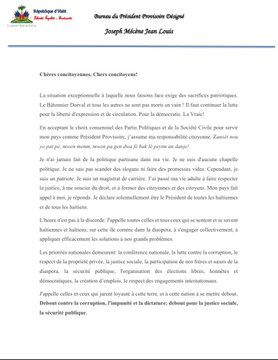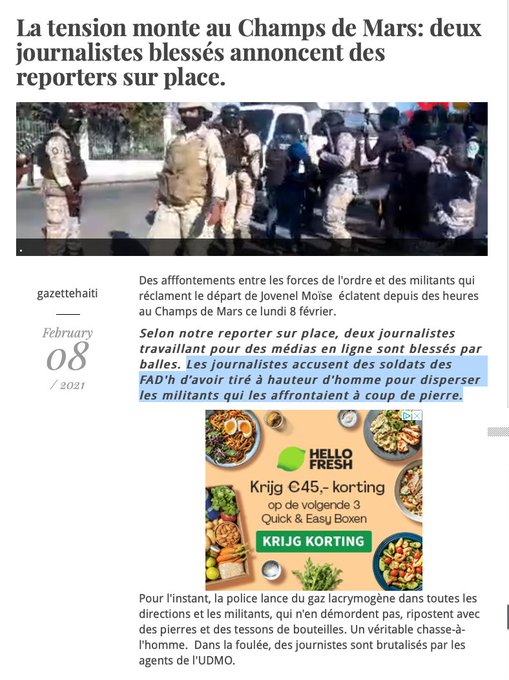Thirty-five years to the day Baby Doc fell a Duvalierist president who should be leaving office is extending his term against the wishes of most Haitians and constitutional experts. In his time in office
Jovenel Moïse has restored many aspects of the brutal regime. He suppressed popular protests and instigated a
gang alliance to instill fear in the slums. He has ruled by decree and criminalized protests as “
terrorism”. Shortly after parliament was disbanded because Moïse failed to hold elections, the president selected individuals to rewrite the constitution in flagrant violation of the law. In November Moïse unilaterally decreed the creation of a new National Intelligence Agency with anonymous, legally untouchable, officers who, notes Kim Ives, “
have the power not just to spy and infiltrate but to arrest anybody engaged in ‘subversive’ acts (Article 29) or threatening ‘state security’ i.e. the power of President Jovenel Moïse.” The agency may become analogous to Duvalier’s feared Volontaires de la Sécurité Nationale (Ton Ton Macoutes).
Moïse is the hand-picked successor of
Michel Martelly. A supporter of the 1991 and 2004 coups against elected president
Jean-Bertrand Aristide, Martelly was a
member of the Ton Ton Macoutes. As president, Martelly surrounded himself with former Duvalierists and death squad leaders who’d been arrested for rape, murder, kidnapping and drug trafficking. When Jean-Claude Duvalier returned to Haiti after 25 years, Martelly told the
New York Times no one wanted him prosecuted except for “
certaininstitutions and governments” abroad.
In fact Martelly was
put in put in place by Washington and Ottawa not long after the deadly 2010 earthquake.
In the 2010 election Ottawa intervened to bring far-right president Martelly to power (with about 16 per cent of the votes, since the election was largely boycotted). Canada put up $6 million for elections that excluded Fanmi Lavalas from participating. After the first round, Canadian representatives on an Organization of American States mission helped force the candidate the electoral council had in second place, Jude Celestin, out of the runoff.
Ottawa backed Martelly diplomatically and financially throughout his presidency, including when he sought to ensure arelatively obscure businessman replaced him. Since then, Canada has provided almost unquestioned support for Moïse. Canada has ploughed tens of millions of dollars into the Haitian police and prison system in recent years. They
promoted a policeforce that violently repressed anti-Moïse protests.
It may be hard to imagine that Ottawa would promote the revival of such a notorious dictatorship. But it shouldn’t. Ottawa enabled a young Jean-Claude to take over after François Duvalier died. Canada was among the leading financial contributors to Haiti throughout Baby Doc’s 15-year rule. The aid supported the dictatorship. In “
Canadian Development Assistance to Haiti: An Independent Study”, a 1984 report by the semi-official North South Institute, Edward Philip English writes: “It would be naive to pretend that this aid does not contribute to the support of the existing regime, at least in the short-run. It helps to legitimize the regime in the eyes of Haitians by demonstrating international approval and it generates projects and jobs, which the regime is careful to associate with itself as much as possible.”
English adds, “CIDA has placed Canadian advisors as ‘experts’ in several Haitian ministries.” In
Spy Wars David Stafford and Jack Granatstein describe one of the individuals leading the CIDA program: “[Hugh] Hambleton lived in true grandeur in the capital, Port-au-Prince, working closely with officials of the notoriously corrupt and brutal government of its dictator, ‘Baby Doc’ Jean-Claude Duvalier.” Canadian officials even influenced who Baby Doc appointed finance minister. Three days before Baby Doc fled, Québec Premier Robert Bourassa refused to comment on whether Prime Minister Brian Mulroney should seek the dictator for life’s exclusion from an upcoming summit of the Francophonie.
Ottawa was even more openly supportive of maintaining ‘Duvalierism without Duvalier’ after the young dictator fell. In the four years after Duvalier fled Canada provided significant assistance to a series of military lead regimes. In November 1986 External Minister Monique Landry visited Haiti to meet government head General Henri Namphy. Canada announced
$80 million in assistance over five years and Landry also invited Namphy to the Summit of la Francophonie in Quebec City the next year. As the violent, anti-democratic, nature of the military regime became undeniable Ottawa resisted shifting gears. In the face of significant criticism from the Haitian community and Québec left, Ottawa largely maintained its various forms of support to the military regimes.
Thirty-five years later not much has changed. After forcing Jean-Claude out Haitians struggling for a more just and democratic society face a similar predicament. They not only have to contend with the power of their own ruling elite but are also up against Canada and the US.
Canadians of conscience should support those mobilizing in Haiti today against creeping Duvalierism. It is the least we can do to make up for the shameful role this country has played in that impoverished nation.







